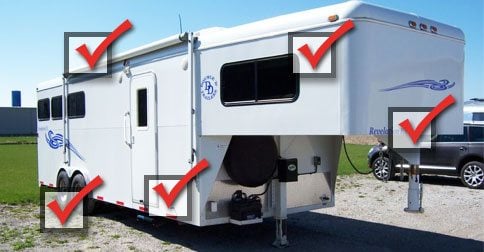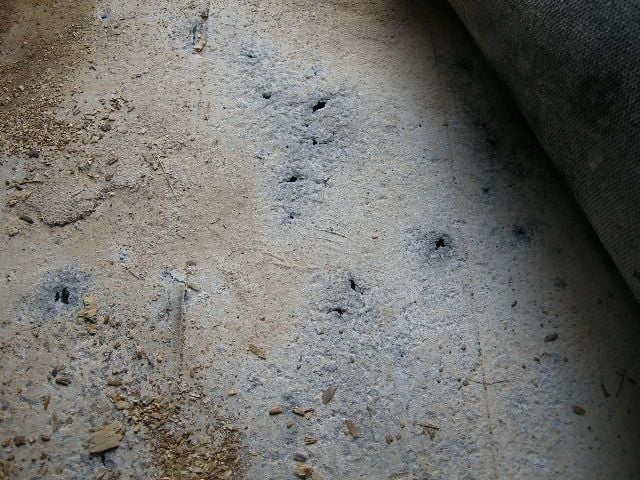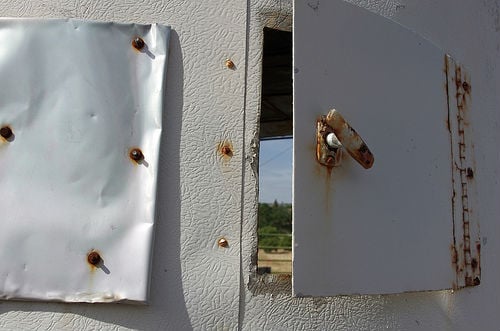You May Be Ruining Your Trailer: 5 Winter Storage Tips To Add To Your Horse Trailer Maintenance Checklist

Autumn is fast approaching and many horse owners are parking their trailers for the season. Let’s face it… trailers are expensive and winters can be harsh! Improper storage over the winter can turn a perfectly fine trailer into a moldy-rusty-leaky mess. We spoke with horse trailer designer, Brad Heath, to learn five easy tips to add to your winter horse trailer maintenance checklist. These tips will help ensure that you don’t need to go shopping for a replacement trailer when spring arrives.
1. We’ve all heard of ‘spring cleaning,’ but try some ‘fall cleaning’ too.
The first thing that you can add to your horse trailer maintenance checklist so it survives winter is to give it a really thorough cleaning once autumn arrives. Your trailer receives a lot of abuse throughout the year. Dogs pee on the tires corroding the rims. Manure and urine filled hay is often left on the floor without cleanings between uses. Road debris chips away at your paint job and the summer sun beats endlessly down on your trailer’s roof.
Urine filled straw that is left directly on the wooden floorboards can be a huge problem. Brad explained, “The wood gets wet and stays wet and that’s where rot is going to occur. This is something you don’t want to see. By all means, clean that stuff out!” The best way to clean out your trailer is to sweep out the mess, hose down the mats, remove the mats, hose down the floor, and put it all back together again once it is dry.
If your trailer has an aluminum floor beneath the rubber mats, the urine can be even more of a problem. “We took in an aluminum trailer on trade and when we took up the stall mats we saw holes in the aluminum flooring.” As it turns out, the original owner had allowed dirty bedding to sit on the horse trailer floor for several years without cleaning. Urine and aluminum don’t mix well. As the urine soaked into the metal, it broke down and caused the floor to pit. Eventually, white rust formed on top of the aluminum along with holes. “The only way to repair it was to completely replace the floor and that can be very expensive.”

This aluminum floor is pitted with rust and holes because the owner left urine filled bedding on its surface for months without cleaning.
“It’s like going to bed with sugar on your teeth!” Brad exclaimed. “Clean that trailer out, get rid of hay and urine more than once a year.”
The second thing you can do as part of your ‘fall cleaning’ routine is to wash your trailer and apply a good coating of wax. Brad agreed. “I think wax is a fantastic idea! The problem is that many folks won’t bother to do it. They will spend $30,000-$50,000 on a truck and take meticulous care of it. Then, they spend the same on a trailer and just let it sit out in the pasture getting abused.” Overtime, sunlight and the elements will break down the trailer’s graphics and paint. “I highly recommend waxing your trailer.
2. Check for rust and corrosion on all steel parts.
Look over your trailer for paint chips or scrapes that may require touch up paint. If these areas are left bare to the elements they will surely develop rust over the winter months. This is especially important if you own an all-steel trailer. “If the paint does get chipped, it’s a steel piece underneath and that could certainly rust, so I would recommend touching it up with some paint,” Brad shared. “The biggest place that rust occurs is in the seams where the tubing attaches to the side sheet metal.” Rust is most likely going to occur here because that’s where moisture often gets trapped. “I’ve seen water get inside tubes in trailers and when water freezes it expands and it can warp the outside of the trailer.”
Rust will often start on a trailer's hinges, bolts, and seams. When you see this type of damage, apply touch up paint quickly before the problem gets much worse.
Brad explained that rust is less of a concern if you own an aluminum or Z-frame trailer, but there are steel components that may rust. For instance, the jacks in the front and the coupler by the hitch are always made of strong steel. With time, constant use can chip away at the paint of these areas and some touch up paint will help keep them nice and rust free. “Another area that people don’t always consider are the axles. They are steel as well so it’s a good idea to crawl up under and see if rust is developing.”
Corrosion can also occur on your trailer’s hinges. “We see this frequently…as they sit through winter months, they will start freezing and corrosion happens on the hinges.” A hinge that has begun to corrode will make a horrible sound when opened. If you force the hinge, it can even break. There’s an easy solution. “WD-40 will work wonders on hinges,” Brad shared. Use some sort of penetrating oil on the hinges in the fall before putting your trailer away and don’t be shy about over-applying. This oil can prevent corrosion from occurring.
3. Store your trailer INDOORS if you can! If that’s impossible, then at least follow these vital rules.
Do you know your trailer’s greatest enemy? The sun! Direct sunlight can degrade the awning fabric, ruin vinyl graphics, destroy rubber seals on your windows, cause havoc for your tires, fade your paint job, and even cause leaks in your trailer’s roof. “The sunlight kills your trailer. It destroys it and it doesn’t take very long for this to happen.”
That is why Brad’s number one piece of advice is to store your trailer indoors if at all possible. Besides avoiding damage from the sun, this will also prevent water damage from occurring. (By the way, moisture is your trailer’s second greatest enemy.) If a totally enclosed garage just isn’t realistic, then try to find another covered area where your trailer can be out of the elements.
For many people, storing their trailer outdoors is the only option. In this case, make sure you protect your investment by buying a high-quality horse trailer cover to keep your rig dry and out of the sun. Don’t just use a tarp as this can often hold in moisture.
So what happens if you don’t cover your trailer in some way? To start, constant exposure to moisture can encourage the growth of mildew on the awning and roof. Ice, sunlight, and rain can destroy the petroleum-based seals around your windows. Your tires also won’t appreciate exposure to the elements. “As a tire goes through a heat cycle, it gets hot and cold. This breaks down the rubber composition and that wears the tires out.” Over time, the tread might still look good, but the whole tire will be compromised.
Direct sunlight on your trailer’s roof can cause it to weaken over time so that leaks occur. This can be extremely destructive if you own a living quarters horse trailer. Brad explained, “When we’re dealing with living quarters horse trailers, water, carpet, and electrical components don’t mix well. Water can begin running inside the trailer and it becomes a nice moldy mess. A little bit of maintenance with a cover can make a big difference long term.”
Here are a few more trailer storing ‘do not’s.’ Do not park your trailer under trees with low hanging branches as the wet leaves can stain your roof paint. Do not allow a large amount of heavy snow to sit on your trailer for weeks on end. Do not store your trailer out in a pasture. “I saw one trailer out in a pasture with goats up on the fenders and horses up against the trailer gnawing on the windows.”
But remember the most important tip…store your trailer indoors if at all possible. Brad summed it up nicely. “Folks that keep their trailer inside will have trailers that still look brand new years later. The more that you can keep it covered up, the better you can protect your investment.”
4. Winter trailer use requires its own unique horse trailer maintenance checklist.
Be smart when you take your trailer out in the winter months. If there are icy conditions on the road, you likely don’t want to be driving at all let along hauling a live load of animals behind you.
If the conditions are fair, remember that there is going to be a great deal of salt and chemicals on the road. “They get onto the trailer, get into the springs inside of the braking mechanism, and can cause corrosion.” If you are going to use a trailer in the winter, be sure to go through a car wash to hose it off. Just remember to make sure the car wash is tall enough to accommodate your trailer!
Also remember that tires tend to lose pressure when sitting for long periods of time. Plus, the colder weather will contribute to a lower overall tire pressure. Always check the inflation level of your tires if you use your trailer sporadically over the winter months.
5. Use the winter months to find an awesome trailer repair shop!
As with all road vehicles, professional help is sometimes needed. Brad says that some shops are really good, while others can be poor. “I have one shop that tries to find things wrong with my vehicle which I like because it’s preventative. Other shops just fix what is a problem and that’s not the best.” In the end, it boils down to the shop and the person. “My recommendation would be to find a really good repair shop and let them go through the trailer every year with maintenance.”
There you have it; five tips to add to your horse trailer maintenance checklist so that your trailer stays in great condition over the winter months. If you keep your trailer clean, stick to a maintenance schedule, properly store it, use smart winter driving practices and enlist the help of a great mechanic, you will likely have a “looks like new” trailer for years to come!


